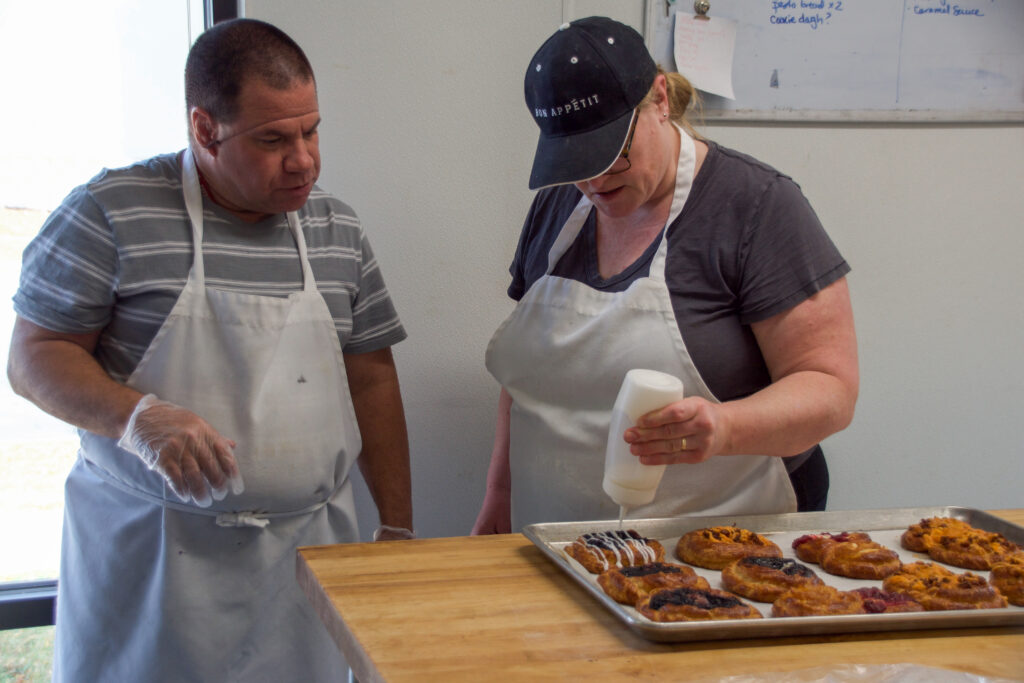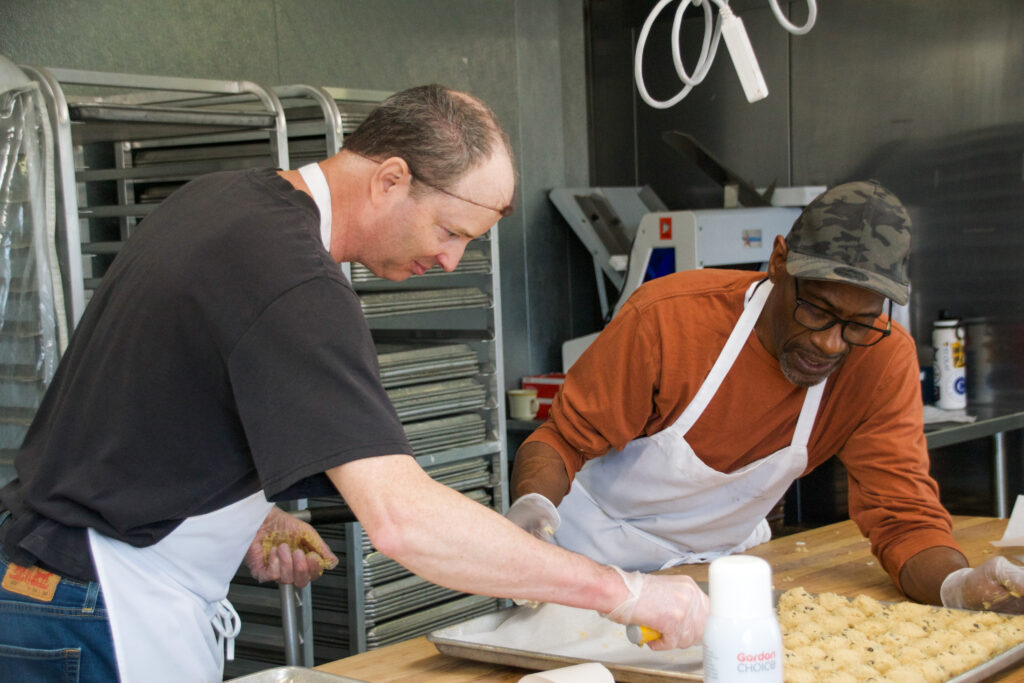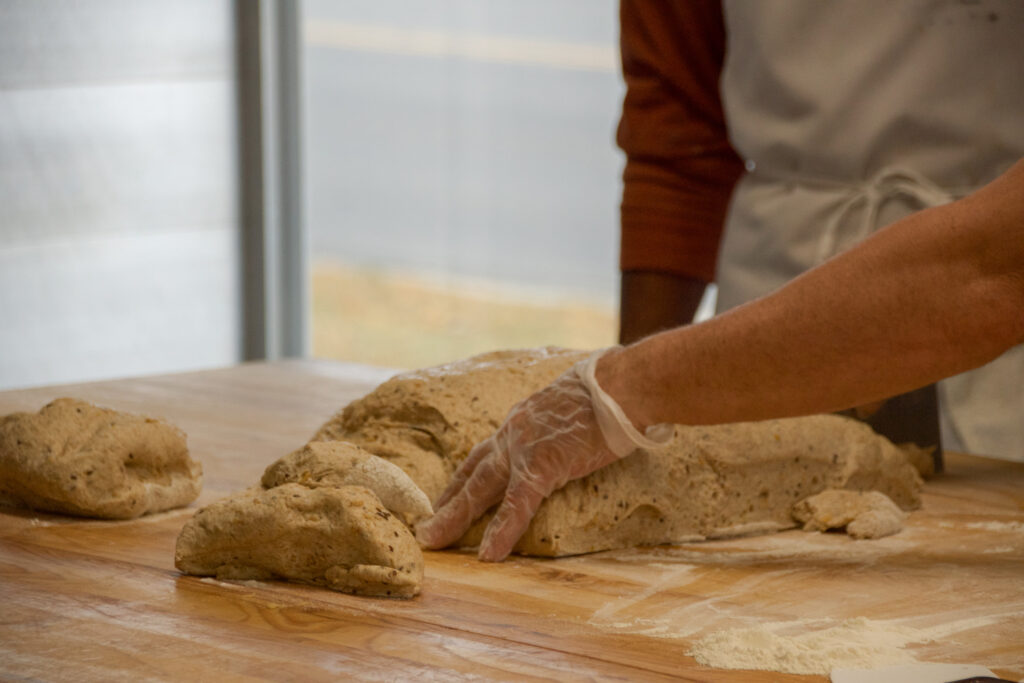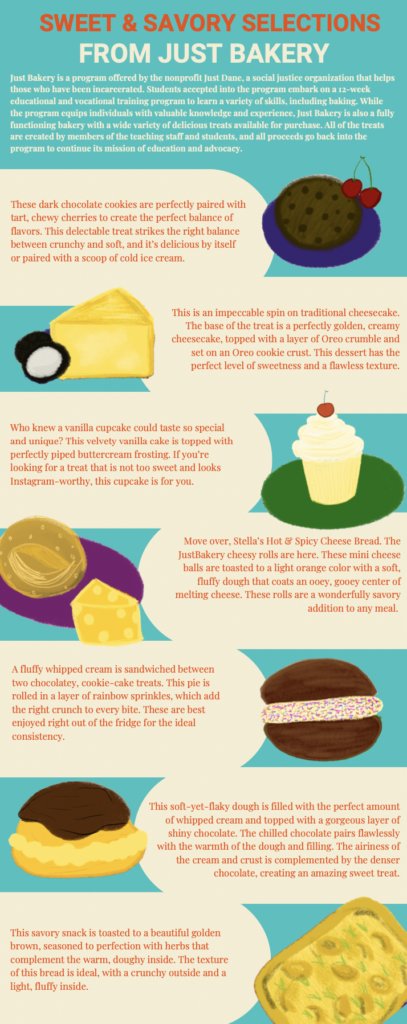Jaclyn Eitrem nestles herself against the large kitchen wall with a clipboard in hand. Racks, tables and crates filled with freshly made baked goods are scattered around the room.
Eitrem calmly answers questions and gives instructions, just as she has done five days a week for the last eight years.
Next door, a tight office space is filled with buckets and boxes of baking materials as well as a normally filled community seating area in the center. In the hallway connecting the two rooms, people briskly stride back and forth, carrying trays of more goodies — and homework sheets.
This space is home to Just Bakery, a 12-week educational and vocational training program for people who have significant barriers to employment. This often includes those who have been previously incarcerated, struggle with addiction or have lasting effects from trauma.
The program gives participants professional development skills and education that allows them to overcome the challenges they face in getting jobs. Assisting those with barriers to employment is vital to them advancing their own futures, and in turn, the community.
Eitrem is the program manager for the Madison nonprofit organization. Students accepted into the program further their educational skills, receive direct admittance to Madison College, learn business and baking techniques, and are given help with housing and education on workers’ rights.
During the program students can earn five nationally recognized certifications, build resumes, take courses, gain professional development skills, and learn baker’s math and self-advocacy skills. The organization even won a civil rights case related to hiring discrimination against people who have previously been incarcerated.

When a person has a criminal record, finding a job becomes more difficult. In the U.S., unemployment rates for formerly incarcerated people are approximately five times higher than the rates for the general public, according to the Prison Policy Initiative.
UW–Madison teaching faculty Patti Coffey teaches psychology courses on criminal psychology and prisoner reentry. In those classes she teaches students about stigma and criminal labels, reentry and crime prevention to “make a better world in terms of making everyone safer.”
Coffey explained employers are less likely to take “risks” when determining if they should hire previously incarcerated people. Gaps in work records, a lack of stable housing, and untreated trauma and health issues all add to the already difficult process of finding a job after leaving prison.
“ Understanding that someone’s past doesn’t define them is huge. “
According to Coffey, programs like Just Bakery help previously incarcerated people succeed because they target all of the areas that are creating barriers to employment and assist in repairing and protecting the community. Restorative justice interventions are in place to lower risks and prevent future incarceration.
Coffey quoted the late U.S. Sen. Paul Wellstone of Minnesota to sum up the value of organizations like Just Bakery: “We all do better when we all do better.”

Photo by Elizabeth Shoop
Creating a safe space to move beyond previous mistakes while gaining valuable knowledge, skills and experiences is vital to reintegrating people into society. The team members at Just Bakery attempt to remove the stigma associated with students’ pasts to allow them to forge a new life and excel in a comfortable, educational, community-based setting.
“Our organization helps people get rid of those labels. It doesn’t make up who they are, they’re humans. They’re people that all that have had life happen to them, that get another chance,” says Candice Young, Just Bakery resource specialist. “Our program gives them a second chance, and it’s not just a part of their life, it’s their whole life.”
Young, now in recovery, found herself in prison after a drunk driving incident. She says she knows firsthand the difficulties of reintegrating into society after incarceration.
Following her release, she decided to go to school to study psychology and help people dealing with substance abuse and mental health issues. Young, a veteran, found Just Bakery after the COVID-19 pandemic derailed her plans of interning at the Veterans Association and led her to the organization.

While joining the team at Just Bakery was not initially part of Young’s plan, the uniqueness of the “all-encompassing” nature of the program drew her to stay.
“I took that role because I saw what the organization did as a whole, and it’s just amazing. They really walk with [students] the whole way,” Young says. “It’s not just a part of something in their life, it’s all of their life, and that’s why I’m still there after nearly five years.”
Young and Eitrem agree Just Bakery is one of the most comprehensive reintegration organizations, addressing all areas of the students’ lives.
“I’ve seen other places, but I think that we’re doing it the best,” Eitrem says.
Students have access to the resources at Just Bakery for one year, even if they do not complete the entirety of the program, and they are allowed to return as students as many times as they want if they ever find themselves falling back into old habits. Multiple students have even returned to the program as full-time staff.
William Reynolds is an example of this. Reynolds, a production assistant for Just Bakery and former program participant, finished the training and holds an associate degree in computer networking.
“ I came from tearing down the community to being a positive in the community. “
Reynolds applied to two grocery store clerk positions and had two great interviews, but was met with a rejection after a hiring manager learned he had a parole officer.
“I’ve got 15 years experience, successful, praise from my supervisor, working with the public, doing a good job at it, it’s their loss,” Reynolds says.
Upon learning about Reynolds’ struggles in his job search, Eitrem saw an opportunity to put his skills to good use.
She asked him to work full-time at Just Bakery, capitalizing on the organization’s mission: giving opportunities to the people who embark on the program journey to build a new life.
“Understanding that someone’s past doesn’t define them is huge,” Eitrem says.
Eitrem says if the U.S. justice system is working properly and people serve their allotted sentences, they should no longer be “doing their time” after serving their time.
Yet with background checks showing previous convictions factored into hiring processes, previously incarcerated people are continuously penalized.
“Just because somebody’s been incarcerated doesn’t mean they don’t have a tremendous amount to offer,” Coffey says. “I believe in the value of each person and multiple chances to do well and to make up for things that maybe they’ve done wrong.”
The advocacy and educational components embedded into the program allow students to rebuild new lives and embark on educational and professional journeys.
While those two elements are crucial, the students explain the community built within the walls of the small bakeshop is what truly motivates them to change their lives for the better.
Phillip Thomas joined Just Bakery as a program participant in 2014 when he and his family became displaced from their home.
When he entered the facility, Thomas considered himself “not a very good person.” However, with newfound responsibilities and a community at the bakery occupying his time, Thomas quickly started to see its positive impact on his life.
“It started out to be just a job, as the years passed this became what I do. I came from tearing down the community to being a positive in the community,” Thomas says.
Since graduating from the program and becoming a production team member, Thomas has connected with 68 classes of students venturing into the Just Bakery program to learn, grow and move forward with their lives.
“I’ve been here 10 years, so I know stuff, and it’s all about this place and keeping it moving forward, keeping the doors open, putting out the best product that I can,” Thomas says. “And none of this can happen without my staff. I got some badass people.”

Sonja Wroblewski is a current member of the production staff who learned about Just Bakery while in jail. After her release, Wroblewski sought out something that would enhance her life and move it forward in a positive way. She turned to the community at Just Bakery in July 2023 as a student and has found a place of support and companionship.
“It’s nice to just have a feeling of support and community when a lot of other people or society in general have kind of cast you to the side,” Wroblewski says.
Reynolds says the group at Just Bakery has kept him from feeling isolated and given him the chance to witness how the community affects others in the program.
“I’ve seen a lot of people having a horrible time in their lives trying to get past whatever they had gone through,” Reynolds says. “Once they come through here, it’s like they found their community.”
Coffey has her students read the book “Halfway Home” by Reuben Jonathan Miller. To Coffey, this title symbolizes the work organizations like Just Bakery do for previously incarcerated people.
“We don’t want people just halfway home, I want to bring everybody all the way home. Programs like Just Bakery and Just Dane do that,” Coffey says. “Getting paid is important, the skill is important, all the training and mentoring is important, but it’s really about giving people a warm welcome back.”
Goodies to Grab

Cover photo: Thomas shows students how to shape bread loaves. Photo by Elizabeth Shoop.
Tile photo: Just Bakery program participant Tramaine Weaver transfers his freshly glazed pastries to share with his fellow classmates. Photo by Elizabeth Shoop.
Published Dec. 9, 2024